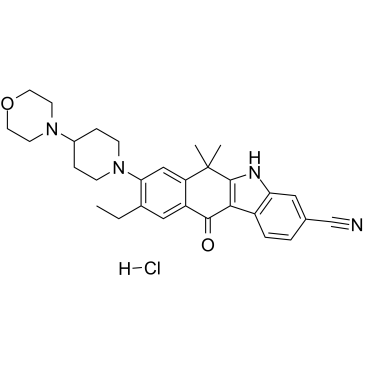Alectinib Hydrochloride |
| Catalog No.GC35280 |
Alectinib Hydrochloride (CH5424802 Hydrochloride; RO5424802 Hydrochloride; AF-802 Hydrochloride) est un inhibiteur ALK puissant, sélectif et disponible par voie orale avec une IC50 de 1,9 nM et une valeur Kd de 2,4 nM (de manière compétitive avec l'ATP), et inhibe également ALK F1174L et ALK R1275Q avec des IC50 de 1 nM et 3,5 nM, respectivement. Alectinib démontre une pénétration efficace du système nerveux central (SNC).
Products are for research use only. Not for human use. We do not sell to patients.

Cas No.: 1256589-74-8
Sample solution is provided at 25 µL, 10mM.
Alectinib Hydrochloride (CH5424802 Hydrochloride; RO5424802 Hydrochloride; AF-802 Hydrochloride) is a potent, selective, and orally available ALK inhibitor with IC50 of 1.9 nM, the dissociation constant (KD) value for ALK in an ATP-competitive manner is 2.4 nM using a competition-bind assay. IC50: 1.9 nM (ALK), 1 nM (ALKF1174L), 3.5 nM (ALKR1275Q)[1]Kd: 2.4 nM (ALK)[1]
Alectinib (CH5424802) prevents autophosphorylation of ALK in NCI-H2228 NSCLC cells expressing EML4-ALK, and Alectinib also results in substantial suppression of phosphorylation of STAT3 and AKT, but not of ERK1/2[1]. Alectinib (CH5424802) shows high kinase selectivity and strong anti-proliferative activity against KARPAS-299 with an IC50 value of 3 nM[2].
In the NCI-H2228 model, once-daily oral administration of Alectinib (CH5424802) results in dose-dependent tumor growth inhibition (ED50=0.46 mg/kg) and tumor regression. Treatment of 20 mg/kg Alectinib shows rapid tumor regression (168% tumor growth inhibition; p<0.001), the tumor volume in any mouse is <30 mm3 after 11 days of treatment (at day 28), a potent antitumor effect is maintained, and tumor re-growth dpes not occur throughout the 4-week drug-free period[1]. Oral administration of Alectinib (CH5424802) at 20 mg/kg displays significant tumor regression without body weight loss in an established ALK fusion gene-positive NSCLC xenograft model in mice[2]. Alectinib at 60 mg/kg causes tumor regression against EML4-ALK-positive NCI-H2228 xenograft model and decreases the levels of phosphorylated ALK in this model. In addition, in mice at dose levels up to 60 mg/kg of Alectinib, there is no body weight loss, no significant change in peripheral blood cell count, no elevations of aspartate aminotransferase or alanine aminotransferase, and no substantial change in electrolytes. Oral administration of Alectinib at 60 mg/kg for 4 days results in significant tumor regression seen in the luminescence signal[3].
[1]. Sakamoto H, et al. CH5424802, a selective ALK inhibitor capable of blocking the resistant gatekeeper mutant. Cancer Cell. 2011, 19(5), 679-690. [2]. Kinoshita K, et al. Design and synthesis of a highly selective, orally active and potent anaplastic lymphoma kinase inhibitor (CH5424802). Bioorg Med Chem. 2012, 20(3), 1271-1280. [3]. Kodama T, et al. Antitumor activity of the selective ALK inhibitor alectinib in models of intracranial metastases. Cancer Chemother Pharmacol. 2014 Nov;74(5):1023-8.
Average Rating: 5 (Based on Reviews and 9 reference(s) in Google Scholar.)
GLPBIO products are for RESEARCH USE ONLY. Please make sure your review or question is research based.
Required fields are marked with *




















